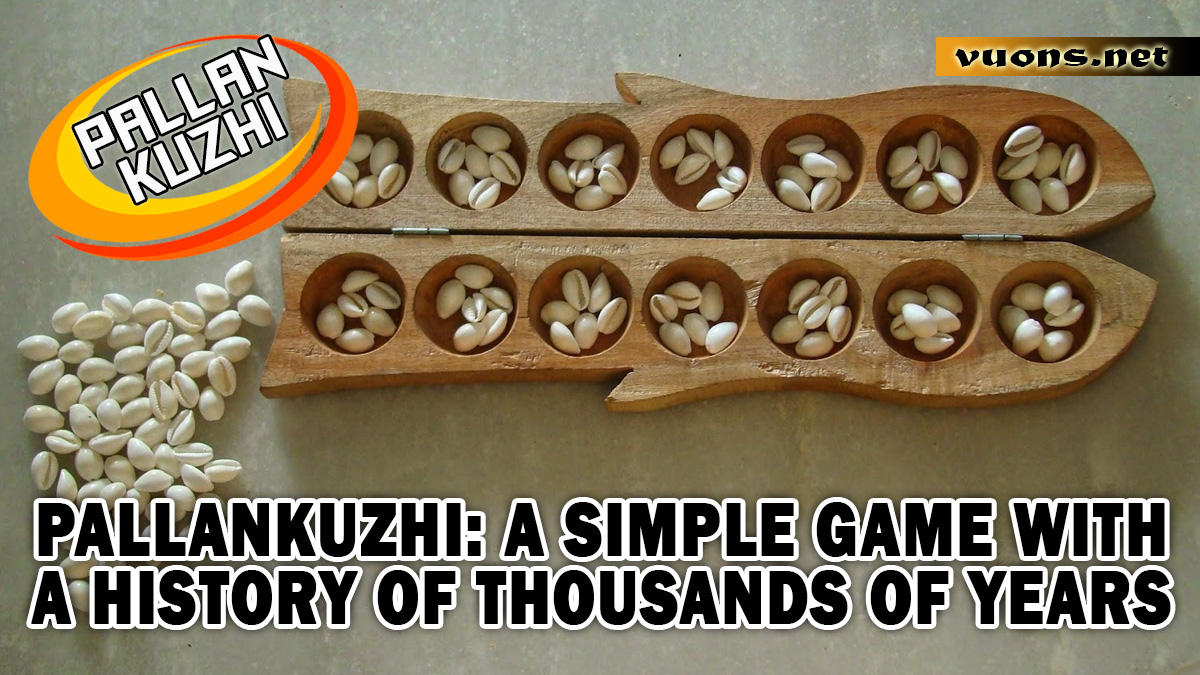History of Pallanguzhi in Indian Culture
The Origins of Pallankuzhi: Traces of an Ancient Game from Tamil Nadu
History of Pallanguzhi in Indian Culture – Pallankuzhi is one of the oldest traditional Games that originated from Tamil Nadu, South India. The game has been played for thousands of years and is believed to have links to the ancient Dravidian culture. In many historical literatures, Pallankuzhi is mentioned as a game that not only serves as entertainment, but also as a tool to train strategic thinking skills and strengthen social relationships.
The Pallankuzhi board is usually made of wood with 14 holes arranged in two parallel rows. Each hole is filled with small seeds, such as tamarind seeds or small shells. The game is played by two people with simple rules that involve picking and distributing seeds to other holes. However, behind its simplicity, Pallankuzhi requires careful planning and strategy to win.
The game is often played by women during harvest time or during family celebrations. In Tamil culture, Pallankuzhi is not just a game, but part of a tradition that is passed down from generation to generation. In fact, in some cases, the game is associated with Hindu mythological stories, such as the story of Lord Krishna who is depicted playing with similar objects.
In modern times, the popularity of Pallankuzhi has declined due to the emergence of digital entertainment. However, efforts to preserve the game continue through various cultural festivals and workshops. Not only in India, Pallankuzhi also has similar versions in other countries in Southeast Asia, such as congklak in Indonesia and Sungka in the Philippines, showing the widespread influence of ancient Indian culture.
Philosophical Meaning Behind Pallankuzhi
Pallankuzhi, a traditional game from South India, is more than just entertainment. Behind the rules and the small seeds that are moved from one hole to another, there is a deep philosophical meaning. The game is often seen as a representation of life, where each move reflects planning, sacrifice, and the results of decisions made.
In Tamil culture, Pallankuzhi symbolizes the cycle of life and balance. The seeds used in the game are often associated with the seeds of life, while the board with its holes is considered a symbol of the earth that holds sustainability. Players must be wise in distributing the seeds, which illustrates the importance of sharing resources and creating harmony among communities.
In addition, the game teaches the values of patience and strategy. In each turn, players are faced with choices that affect the final outcome. This philosophy is in line with the view of life in traditional Indian culture, where every action has consequences, both short-term and long-term.
Pallankuzhi also has a spiritual aspect that is often overlooked. In some traditional societies, the game is played during special times, such as harvest festivals, to celebrate the relationship between humans and nature. The game’s process of collecting and distributing seeds also reflects respect for the cycles of nature and the importance of maintaining ecological balance.
With its philosophical background, Pallankuzhi remains more than just a traditional game. It is a reminder of the values that shape human life and the universe.
The Influence of Pallankuzhi in the Lives of South Indian People
Pallankuzhi is a traditional game that has a profound influence on the lives of South Indian people, especially in Tamil Nadu, Kerala, and Karnataka. This game not only serves as entertainment, but also becomes an important part of the social and cultural life of the local community.
In everyday life, Pallankuzhi is often played by women during their free time, especially in rural areas. This game is a means to strengthen relationships between family members and communities. In the past, children were taught to play Pallankuzhi to practice counting, planning, and strategic thinking skills from an early age.
During traditional celebrations and festivals, such as Pongal in Tamil Nadu, Pallankuzhi is often part of family activities. This game is played as a symbol of togetherness and gratitude for a bountiful harvest. In some cases, Pallankuzhi is also used as a tool to convey folklore and moral values to the younger generation.
In addition to the social aspect, Pallankuzhi has a spiritual influence in some communities. This game is often considered a symbol of the cycle of life and balance. Many people believe that playing Pallankuzhi can bring peace of mind and harmony in social relationships.
In the modern era, although the popularity of Pallankuzhi has declined, efforts to preserve it continue through cultural festivals and educational activities. This shows how the game remains relevant as part of the identity of the South Indian people.
Pallankuzhi as Traditional Entertainment and Educational Tool
Pallankuzhi is a traditional game that has been an important part of South Indian culture. Apart from being a form of entertainment, it also has a high educational value, making it a popular learning tool among the masses, especially children.
As a form of entertainment, Pallankuzhi is often played in leisure time by children and adults. Its simple yet challenging nature makes it appealing to all age groups. With a wooden board decorated with 14 holes and small seeds as the playing tools, Pallankuzhi provides a gaming experience that combines fun and strategic skills.
The game also serves as a traditional educational tool. Children are taught to count, plan, and think logically while playing Pallankuzhi. The process of distributing the seeds to each hole naturally trains basic math skills, such as addition and subtraction. In addition, the game teaches important values such as patience, hard work, and respecting one’s turn.
In the past, Pallankuzhi was also used as a tool to teach the concepts of balance and responsibility. With grains as a symbol of resources, the game emphasizes the importance of fair distribution and wise management. This philosophy is in line with the agrarian life of South Indian society, which relies on cooperation and sustainability.
To this day, Pallankuzhi continues to be played at family events and festivals, proving that the entertainment and educational values it offers remain relevant despite changing times.




